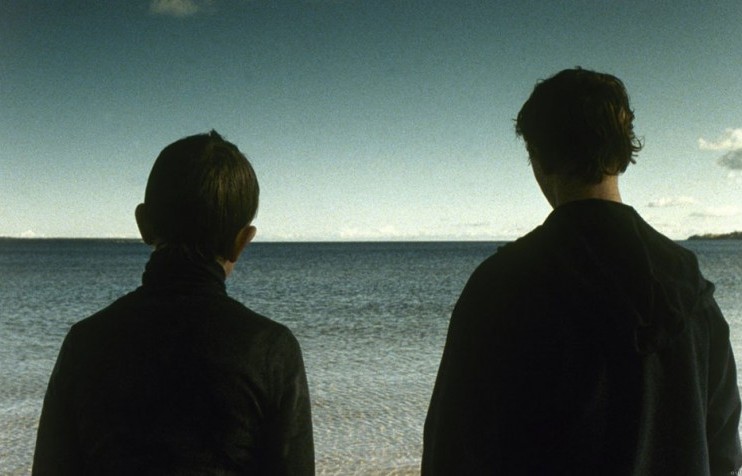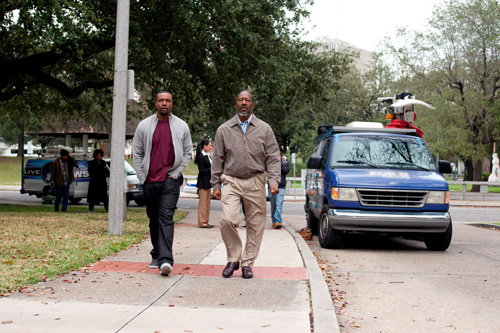
Peculiarly, pathos has proven to be a more reliable element in comedies than in dramas. The pitiful man tends to incite a curious form of laughter than he would empathy, especially when his piteousness is welded with a muted strain of conceit. This is particularly a male phenomenon as well. By account of his built-in vanity and his lack of natural poise, the ultimate nonfulfillment of man, more than woman, almost seems deserved, as though karma has finally come forth to give the excessively proud its comeuppance. Since even in sadness these men refrain from grace, this blow to their vanity turns humorous, their every pretense conspicuous to a detached audience and their every lie palpable. We are prompted to engage with the work by laughing at the ignoble fool’s ignorance of everyone’s cognizance, as he lies and patronizes, while everybody sees through him except for himself. He’s thus as funny as he is infuriating. A more meticulous author, however, impels the viewer to play a greater role – to do more than just laugh at a bumbling fool. A conscientious author would steer the audience beyond the obliviousness of their protagonist, showing instead that though their hero seems unaware, he is quite thoroughly the opposite: one who deliberately disregards his own charade only because he’s lost his purpose in the world. Nuri Bilge Ceylan’s Winter Sleep is an incontestable masterpiece for this reason. Taking its time to weave nuances and quietly wavering between humor and sorrow without opting for a controlled motif, the film succeeds in painting a complete portrait of pitiful superfluity, while in turn, also shepherding a whole new class of filmmaking, that of the sprawling, cinematic novel.
Among Ceylan’s exceptional traits is his skill at depicting, visually, the drone of boredom. Life, in Winter Sleep, occurs only while tedium whirs in the background. Though this note of tedium is constant, the actual pace of life differs between the film’s two principal classes of characters. Aydin (Haluk Bilginer), alongside his wife Nihal (Melisa Sözen) and sister Necla (Demet Akbag) are of the more affluent class, the patriarch having inherited his father’s hotel, situated on high ground and far from town, and dwelling there with his family of servants and relatives. Life for them comprises only of existing; they move at leisurely paces and are often found either merely sitting or standing in the hotel’s many rooms, motionless like the life around them. This is not necessarily emphasized by Ceylan, as his film hardly concerns itself with class structures. The gluttony of the well-heeled as opposed to the grace of the impoverished, though imbued, is never once pronounced; the director seems to imply that each class is haunted by its own misfortunes. Rather than adjudicate, Ceylan takes the path of subtlety, propagating in consequence, not empathy based on rank but person, as the personality of each character gradually peels and reveals parallel hints of both vice and virtue. The temperaments of these characters are so well-crafted that, doubtlessly, each could easily be the subject of a cinematic novel of her own.
Beneath the hill, in the dilapidated town, live Aydin’s tenants. Because of their inability to pay their rent, Aydin has threatened them with action, divesting them of their television as warning. This unimportant detail is actually quite noteworthy, not in delineating the film itself, but its inspirations, and particularly its link with Russian literature. In Anton Chekhov’s rendering of similar events in his story The Peasants, the landlord divests a peasant family from their samovar due to their failure to pay their rent; the removal of the samovar considered by these peasants as the lowest point that they could reach:
“It was hopelessly dreary in the Tchikildyeevs’ hut without the samovar; there was something humiliating in this loss, insulting, as though the honour of the hut had been outraged. Better if the elder had carried off the table, all the benches, all the pots — it would not have seemed so empty.”
For Aydin’s tenants, the television is the modern variant of the samovar, its removal strongly marked as the ultimate form of humiliation. It’s this minor act that leads the young boy of the household to come behind Aydin’s vehicle and throw stones at it. Again, though the boy’s actions might seem minor, they are quite significant in relation to the family’s slighted pride. Though the film hints once more at an ensuing class conflict between proprietor and occupant, this quarrel never quite comes to fore. The true conflict of these characters has little to do with their social status; it has to do with themselves.

The most schismatic of these inward conflicts is Aydin’s, his masked but palpable sense of self-importance clashing ceaselessly with his painful recognition of a life unlived. A former actor, he planks himself inside his under-lit office every day with the intent to write a history of Turkish theatre. His time, however, is instead spent writing articles for the local paper. He prides himself on these articles; each extracted from daily experience and kneaded from subjective to objective with careful deliberation. At first, because he seems concerned with the mannerisms of his town, his writing comes across as a relatively noble pastime. But when his sister finally denounces him for the pretense, Aydin’s true motives become clear. Each of his dictums for better society appears to have stemmed from enmity. When Hamdi (Serhat Mustafa Kiliç), his threatened tenant as well as the local cleric, turns up at his home to petition for more time to pay the rent, Aydin only detects the foul smell of the cleric’s socks, subsequently exploiting this trifle in his article about the hygiene of religious leaders. He does not notice that Hamdi’s stinking feet were not an upshot of bad hygiene, but a consequence of his journeying all the way from town to see him. This instance again sheds light on movement varying between social classes, one traversing short distances to do nothing, while the other roves a hill to beg for time. As the monotony of life drones on, Aydin’s many affectations become even more palpable, ultimately pitting him as not just a superfluous man (another Russian trope), but a tormenter as well. But he is never not pathetic either, evoking sadness as a man and triggering dismayed laughter as a tyrant. He thus embodies each and every configuration of pathos within himself, his pitifulness both humorous and harrowing.
It is ironic, then, that Andrey Zvyagintsev’s Leviathan, an actual Russian film, which touches upon similar themes, fails to evoke any of the subtleties of the Russia Ceylan seems to have imported into Anatolia. An unabashed retelling of the Book of Job, the film steers itself deep into relentless melodrama, prostituting pathos in order to simplify a difficult tale using clear-cut antagonists and protagonists, namely, the rich and poor. Boasting a plot much alike Winter Sleep’s proprietary subplot, Leviathan is at its very best when its scope is narrowed and focused on the family dynamics of its protagonists. Aleksey Serebryakov is especially outstanding as the drunken and mercurial Nikolai, whose family home – also curiously positioned atop a hill and far from town – has been appropriated by the municipal government. He fights to preserve both his home and family, but is thwarted constantly by powers beyond his control. Is he being punished for having questioned the powers that be, or is it wanton, celestial mistreatment like the horrors that befell Job? The film pretends to have no answer, but its not-so-subtle undertones sing a more didactic tune.
The title of the film seems to be both a direct reference to Job as well as to Thomas Hobbes’ treatise on society’s inherent need for an oppressor. The former allusion pertains to Nikolai, while the latter is more in line with the disposition of the town’s corrupt mayor, played by Roman Madyanov. As opposed to the nuanced Aydin, Leviathan’s mayor is wholly stripped of intricacies; overweight, debauched, and cowardly, he even boasts the classical, caricatural traits of corruption. As hyperbole would have it, he is never once glimpsed at in a moment of doubt or vulnerability. The film’s only concession is to also portray him as a religious man, disastrously melding, as a result, corrupt government with divinity, a deviation that is neither subversive nor original. As the corruption mounts and his life steadily falls apart, Nikolai is surveyed endlessly while he downs glassfuls of vodka as calamity after calamity befalls him, each orchestrated by the stout and pious bigot who wants his house. Its unnecessary swelling of tragedies aside, the film remains static, its only change of pace marked by Nikolai’s promotion from glass to bottle.
“After establishing its stance as a primarily political film, Leviathan, throughout its entire duration, unfailingly appears as though it’s on the verge of saying something new, only to remain firmly mute thereafter. Audience ill treatment is fine so long as it’s done with a distinct purpose – as is the case with Michael Haneke’s Funny Games – but Leviathan, verging on offensiveness for its lack of tact, manipulates without purpose, wresting anguish from its audience and returning the favor with nothing but stock tirades on the cruelty of god and politics. Amusingly, having not stamped its feet onto the screen bellowing its intent, Winter Sleep manages to touch upon the motifs Leviathan endeavors to in its undercurrents, leaving the platitudinous narratives of politics, class strife, and divinity to gently cook beneath the surface, while a grander, more personalized story is told at the fore. In fact, despite its unyielding realism, Winter Sleep’s effects are most akin to fable, open to constant revisitation, eloquent yet elaborate, and never once daring to tell its tale in the same way. Leviathan instead cries like a colossus and begs to be sought after, only to tremble like a fish out of water when stumbled upon.”
Morad Moazami



